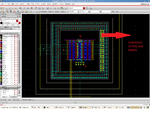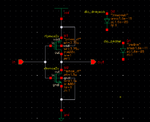Ata_sa16
Full Member level 6

- Joined
- Mar 29, 2016
- Messages
- 343
- Helped
- 59
- Reputation
- 118
- Reaction score
- 58
- Trophy points
- 28
- Location
- Milky Way Galaxy, 179° 56′ 39.4″
- Activity points
- 2,221
Follow along with the video below to see how to install our site as a web app on your home screen.
Note: This feature may not be available in some browsers.



There is hard to see details in layout, so I can only guess.
1. Check if you have connections from transistors to substrates (bodies).

If yes, the technology you are using can be triple well. In this case it is possible do add these diodes (dnwpsub and pndnw) to inverter schematic.


You place the symbol from the foundry devices library as
you would any other. Look for the dnwpsub device there
and place it in the schematic with realistic connections
(psub may be a "gimme", or inherited net; nwell is circuit
design defined).
The problem is that extract "sees" the diode and yet it
is not represented within one or both of the explicitly
placed devices' schematic hierarchy. This is a low grade
nuisance in a PDK I'm familiar with, have to place these
diodes in every steenkin' schematic by hand (and then
go back and fiddle each one's properties to match
whatever LVS gripes about next).


